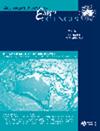西澳大利亚坎宁盆地碳酸盐岩和碎屑沉积岩的原位方解石U-Pb地质年代学
IF 0.9
4区 地球科学
Q3 GEOSCIENCES, MULTIDISCIPLINARY
引用次数: 2
摘要
摘要在沉积盆地中,确定沉积和成岩事件的绝对时间是重建古流体演化和埋藏史的一个具有挑战性但又至关重要的参数。在这里,我们展示了原位方解石U–Pb地质年代学在西澳大利亚坎宁盆地Olympic 1井岩心样品上的实际应用。使用定量矿物学和激光烧蚀电感耦合等离子体质谱(LA-ICP-MS)分析技术,我们获得了469.7的自生方解石U–Pb年龄 ± 4.3 下奥陶统Nambeet组Samhire沼泽段石灰岩的Ma。这种精确的沉积年龄可以使用锆石热电离质谱法独立验证,U–Pb年龄为479.4至470.2 马确定在相邻的火山灰层上。对Nambeet组下奥陶统飞坪段砂岩中方解石胶结物的进一步地质年代研究表明,U–Pb年龄为365.3 ± 5.8 马。这是第一项对堵塞砂岩储层粒间空间的成岩事件进行绝对年龄约束的研究。方解石胶结年龄表明,飞坪段砂岩储层质量的损害发生在晚泥盆纪,远早于坎宁盆地的主要石油充注事件。方解石U–Pb地质年代计与互补的定量矿物学分析相结合,可以对世界各地盆地中碳酸盐岩和碎屑沉积岩的沉积和成岩过程建立直接的时间约束。要点将自动扫描电子显微镜/能量色散X射线光谱定量矿物学分析与LA-ICP-MS分析相结合,可以实现更可靠、更有效的原位方解石U–Pb定年。准确年龄为469.7岁 ± 4.3 马是在坎宁盆地下奥陶统Nambeet组Samphire沼泽段碳酸盐岩沉积中获得的。方解石胶结年龄365.3 ± 5.8 马为康宁盆地飞坪段砂岩储层的孔隙堵塞岩化提供了绝对的时间约束。原位方解石U–Pb定年可以对沉积盆地的沉积物沉积和共生序列施加精确的时间约束。本文章由计算机程序翻译,如有差异,请以英文原文为准。
In situ calcite U–Pb geochronology of carbonate and clastic sedimentary rocks from the Canning Basin, Western Australia
Abstract In sedimentary basins, the determination of the absolute timing of deposition and diagenetic events is a challenging yet critical parameter necessary in the reconstruction of paleo-fluid evolution and burial histories. Here we demonstrate the practical application of in situ calcite U–Pb geochronology on core samples from the Olympic 1 well in the Canning Basin of Western Australia. Using quantitative mineralogy and laser ablation inductively coupled plasma mass spectrometry (LA-ICP-MS) analytical techniques, we obtained an authigenic calcite U–Pb age of 469.7 ± 4.3 Ma for limestone in the Samphire Marsh Member of the Lower Ordovician Nambeet Formation. This precise depositional age can be independently verified using zircon thermal ionisation mass spectrometry U–Pb ages of 479.4 to 470.2 Ma determined on adjacent volcanic ash beds. Further geochronology studies on calcite cements from the Lower Ordovician Fly Flat Member sandstone from the Nambeet Formation returned a U–Pb age of 365.3 ± 5.8 Ma. This is the first study to place absolute age constraints on the diagenetic event that occluded the intergranular space in a sandstone reservoir. The calcite cementation age suggests that impairment of reservoir quality in the Fly Flat Member sandstone occurred in the Late Devonian, much earlier than major petroleum charge events in the Canning Basin. The calcite U–Pb geochronometer, when combined with complementary quantitative mineralogical analysis, can build direct temporal constraints on the depositional and diagenetic processes in both carbonate and clastic sedimentary rocks in basins worldwide. Key Points The integration of automated scanning electron microscopy/energy-dispersive X‐ray spectrometry quantitative mineralogical analysis with LA-ICP-MS analysis enables more reliable and efficient i n situ calcite U–Pb dating. An accurate age of 469.7 ± 4.3 Ma is obtained for carbonate sedimentation in the Samphire Marsh Member of the Lower Ordovician Nambeet Formation in the Canning Basin. The calcite cementation age of 365.3 ± 5.8 Ma provides an absolute time constraint on pore-occluding lithification of the Fly Flat Member sandstone reservoir in the Canning Basin. I n situ calcite U–Pb dating can place precise temporal constraints on sediment deposition and paragenetic sequence in sedimentary basins.
求助全文
通过发布文献求助,成功后即可免费获取论文全文。
去求助
来源期刊

Australian Journal of Earth Sciences
地学-地球科学综合
CiteScore
2.80
自引率
8.30%
发文量
45
审稿时长
6-12 weeks
期刊介绍:
Australian Journal of Earth Sciences publishes peer-reviewed research papers as well as significant review articles of general interest to geoscientists. The Journal covers the whole field of earth science including basin studies, regional geophysical studies and metallogeny. There is usually a thematic issue each year featuring a selection of papers on a particular area of earth science. Shorter papers are encouraged and are given priority in publication. Critical discussion of recently published papers is also encouraged.
 求助内容:
求助内容: 应助结果提醒方式:
应助结果提醒方式:


